Claim of Suicide Surge in Youths on U.K. Wait List for Gender Care Undermined by ‘Cass Review’
The landmark report on pediatric gender care also undermines suggestions by a British legal group that the clinic all but eliminated pediatric gender-transition treatment referrals in 2021 and that this drove a wave of suicides on the waiting list.
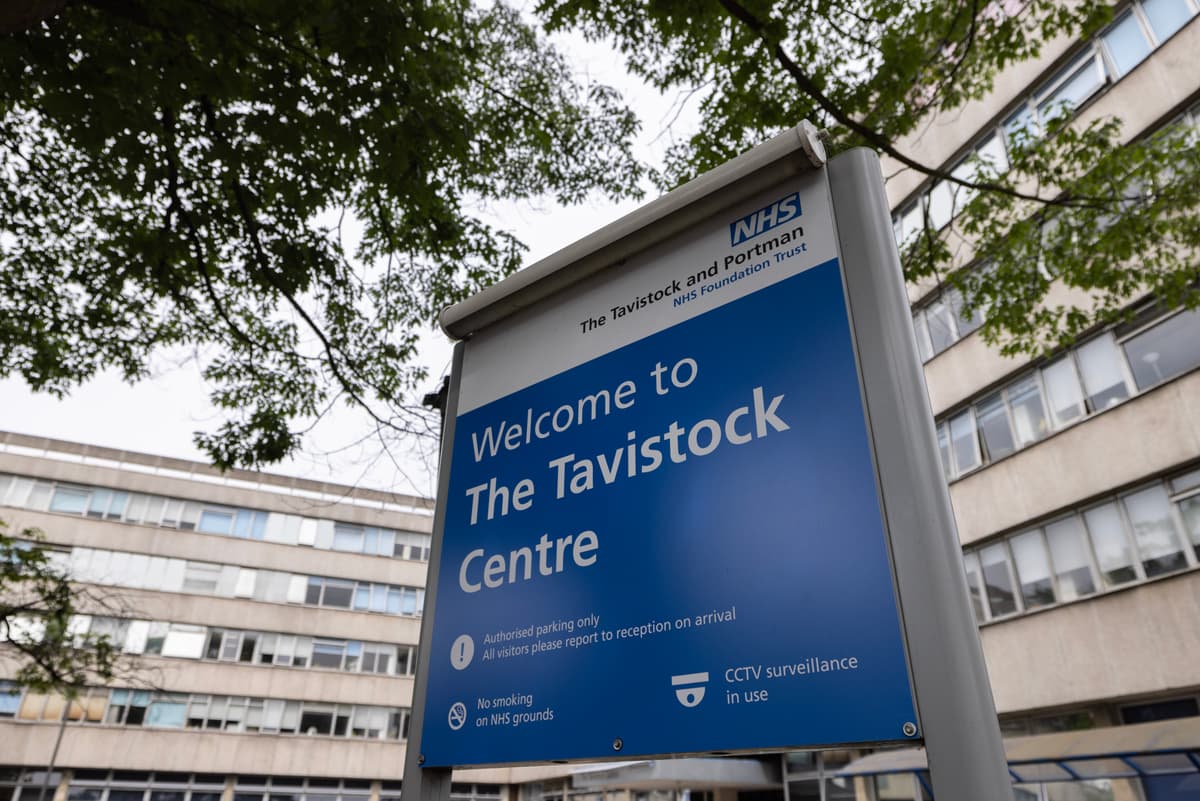
A British legal advocacy group has claimed there was a “huge increase” in suicide deaths among minors on the waiting list for the U.K.’s recently-shuttered pediatric gender-care clinic. This surge, the group argues, is the result of what it characterized as the clinic’s harsh restrictions, beginning in 2021, on adolescents’ access to gender-transition treatment.
However, the recent landmark British report on the care of minors who are distressed about their gender calls into question the specifics of these claims, as does documentation posted on social media by the head of the legal group.
If substantiated, the legal group’s claims would cast a pall over the central recommendations of the report, which is called the Cass Review and was published to global fanfare on April 9. The report asserted that England’s state-funded health care system, the National Health Service, should prioritize comprehensive psychological care for gender-distressed children.
More significantly, though, it further said that those younger than 16 should only be provided gender-transition treatment, including puberty blockers and cross-sex hormones, through clinical trials; at least in the short term, this would sharply limit minors’ access to these treatments. The N.H.S. has heeded Cass’s counsel and is overhauling its care system for such young people accordingly.
The founder and executive director of a British liberal legal advocacy nonprofit, the Good Law Project, Jolyon Maugham, on June 20 claimed on X, formerly Twitter, to have evidence that suicides among minors on the waiting list for N.H.S.’s pediatric gender clinic, the Gender Identity Development Service, or GIDS, increased to 16 deaths from 2021 to 2023 from one death between 2014 and 2020.
Mr. Maugham and the Good Law Project attributed these reported deaths to GIDS having “immediately pulled down the shutters” on pediatric access to gender-transition treatment following a 2020 court decision — a policy shift that Mr. Maugham claimed also led the clinic’s waiting list to balloon.

Yet the Cass Review suggests that at least some of the 16 apparent recent suicide deaths were among youths who were either GIDS patients and thus not on the waiting list or who had already turned 18 and aged out of the program. The review also provides data countering Mr. Maugham’s suggestion that GIDS began harshly restricting access to gender-transition treatment beginning in 2021.
Additionally, a 2022 study found that between 2014 and 2020, there were, in fact, two apparent suicides among minors on the GIDS waitlist, not one; there were also two apparent suicides during that period among minors who had made it off the waiting list and were GIDS patients.
A top British pediatrician, Dr. Hilary Cass, spent nearly four years developing her almost 400-page report on pediatric gender care at the N.H.S.’s behest. In a statement to the Sun, Dr. Cass said her team “spoke with a member of GIDS staff who reported that there had been an increase in deaths among children on the waiting list, but no evidence was provided.” Referring to the N.H.S. division that operated GIDS, she said, “This was not substantiated by Tavistock and Portman N.H.S. Foundation Trust.”
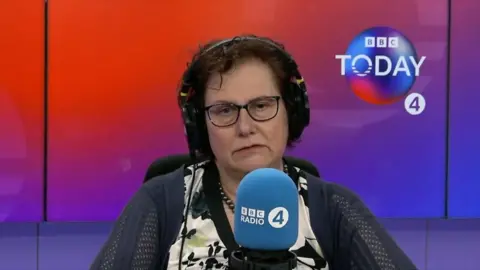
Is the U.K. Denying ‘Life-Saving Care?’
The specter of suicide among gender-distressed youths plays a central and controversial role in the politicized global debate over pediatric gender-transition treatment. It is well documented that such young people suffer from high rates of mental health problems, including suicidal thoughts and behaviors. Supporters of minors’ access to gender-transition treatment typically argue the treatment is effective at improving mental health and often claim this is “life-saving care.”
However, a systematic literature review conducted by the University of York on Dr. Cass’s behalf found no conclusive evidence that puberty blockers are tied to mental health benefits in gender-distressed youth. In a separate review of cross-sex hormone research, the investigators did find some moderate-quality evidence that “suggests mental health may be improved during treatment, but robust study is still required.” Dr. Cass concluded that researchers have not substantiated the claim that prescribing gender-transition treatment to minors prevents suicide deaths.
In March, weeks before the Cass Review’s publication, the N.H.S. solidified new rules that barred its physicians from newly placing gender-distressed minors on puberty blockers. Pediatric prescriptions for cross-sex hormones are now restricted to 16- and 17-year-olds. Dr. Cass concluded that pediatric gender-transition treatment is based on “remarkably weak evidence.” She cautioned U.K. doctors to observe “extreme caution” in prescribing hormones even to older minors.
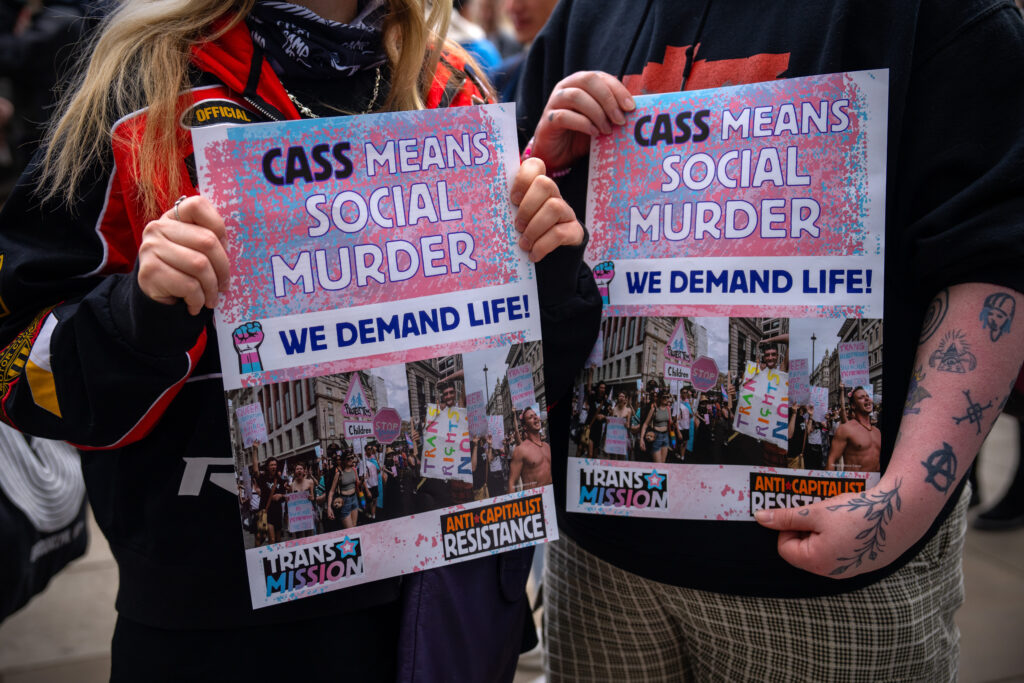
Any British clinical trial of pediatric gender-transition treatment that might provide minors access to such medications first needs to pass muster with an ethics board and is not expected to launch until early 2025 at the soonest.
The Good Law Project’s Shocking Claim
Mr. Maugham has suggested the N.H.S.’s recent move to restrict access to puberty blockers by gender-distressed adolescents, which now aligns the nation with health authorities in four Scandinavian nations, could have a lethal impact on young people.
In his June 20 X thread, Mr. Maugham said his information about a post-2020 suicide surge came from two N.H.S. whistleblowers and other internal documents.
News of the 16 deaths spanning from 2021 to 2023, Mr. Maugham wrote, “are said to come from a presentation to Tavistock staff given by the Named Doctor for Safeguarding Children.” One of the whistleblowers told Mr. Maugham that they had expressed concerns about these deaths to both Dr. Cass and the Tavistock director and complained vigorously “of the failure of both to engage with these numbers.”
Mr. Maugham and the Good Law Project made a bold accusation: that by restricting access to such medication starting in 2021, GIDS administrators drove a “predictable and predicted” wave of suicides.
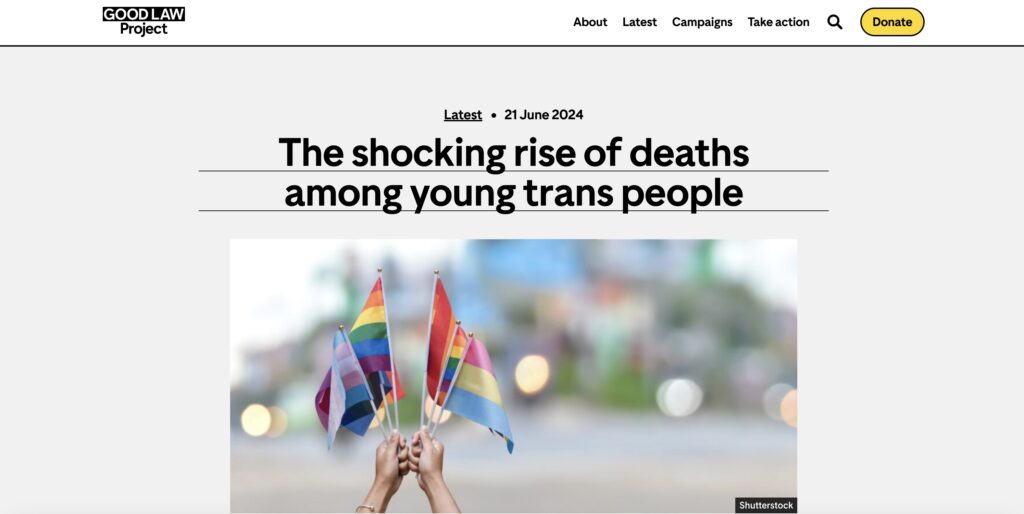
“N.H.S. management has sought to suppress that evidence,” Mr. Maugham wrote.
A clinical psychologist and former GIDS staffer, Dr. Anna Hutchinson, who is among those who in recent years raised concerns about the clinic’s care of gender-distressed children, similarly expressed concern about the potential impact of Mr. Maugham’s words.
“Making assumptions about what has caused any suicide and talking about that assumption in public is known to be dangerous,” Dr. Hutchinson said, referring to research indicating suicide can be socially contagious. “When we’re talking about very distressed children in a toxic environment, we have to be even more careful.”
Dr. Hutchinson stressed that the minors referred to GIDS had a high rate of co-existing difficulties and psychiatric diagnoses that, independent of their gender distress, put them at a higher risk of suicidality.
Mr. Maugham divided his two periods charting suicide death trends, with one death before and 16 after, according to the timing of the December 2020 British High Court decision in the Bell v. Tavistock lawsuit. This case concerned a former GIDS patient who sued the Tavistock Trust over her care there. The court ruled that those younger than 16 were “unlikely to be able to give informed consent” to puberty blockers. The ruling was overturned on appeal in September 2021.
However, it was not solely the late-2020 judgment that led to a subsequent change in GIDS’s methods as Mr. Maugham suggested. This shift was also driven by a January 2021 report from the U.K.’s Care Quality Commission that found the clinic’s care was “inadequate.” Mr. Maugham made no mention of that report.
And so, beginning in August 2021 and at the behest of the N.H.S., a newly established independent review panel began surveying GIDS referrals for patients younger than 16 to see an endocrinologist for gender-transition treatment. The panel sought to ensure that all the appropriate processes had been observed in making the referral.
The Cass Review provides data through April 2023 indicating the panel approved 138, or just more than three quarters, of GIDS’s 180 referrals during these 22 months. By comparison, per the Bell judgment, during a 12-month period from 2019 to 2020, GIDS referred 161 children to endocrinology for puberty blockers. So while the pace of endocrinology referrals definitely slowed after the judgment, they did not all but grind to a halt as Mr. Maugham suggested.
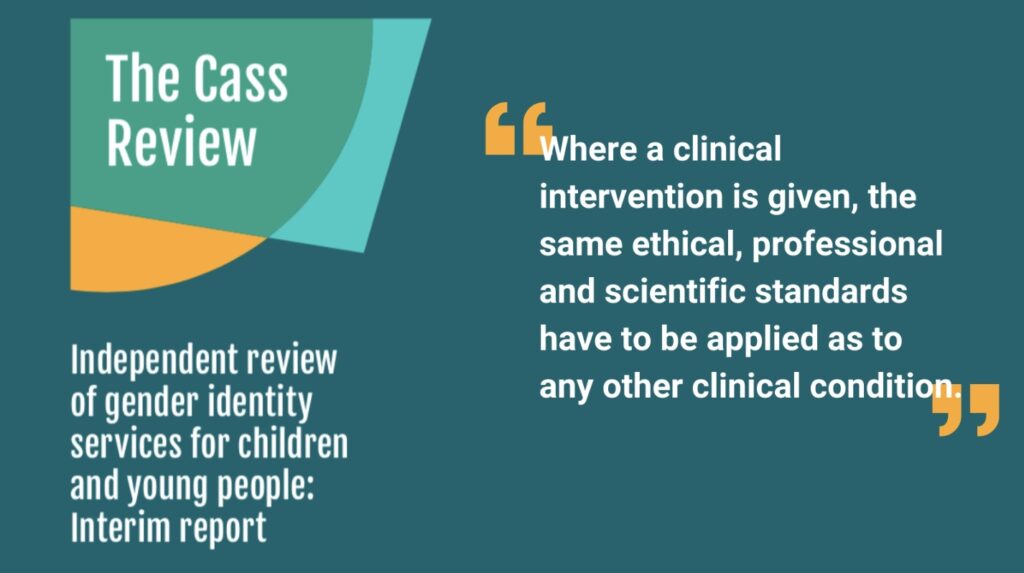
In her book about the downfall of GIDS, “Time to Think,” British journalist Hannah Barnes estimates that since the early 2010s, the clinic referred some 2,000 children to endocrinology, “with the vast majority going on to start treatment.”
Dr. Cass reports that there were 3,820 GIDS patients in the system by early 2023 who had not been submitted for review by the panel. According to Dr. Hutchinson, during the early 2020s, the staff was increasingly demoralized by their “lack of ability to address” the swelling public controversy over their work; and their numbers shrank by attrition. As Mr. Maugham demonstrated from a Tavistock chart he posted, GIDS caseloads shrank during this time.
The Cass Review indicates that the review panel kept up with its caseload; so its own efforts were not likely a driver of the GIDS waiting list. That said, GIDS staffers had to spend more of their time on documentation for the panel’s benefit and Cass indicates that the average number of clinic appointments before a referral apparently doubled after the Bell judgment.
The waiting list swelled to about 6,000 minors by the time the clinic was closed on March 31 of this year and the N.H.S. began establishing the new, Cass-advised care system. Since 2011, GIDS saw about 9,000 patients.
When Dr. Cass was asked about the recent deaths by the Good Law Project, Mr. Maugham said, her team referred the nonprofit to a paragraph in her report in which she recounted that her team met with Tavistock representatives to discuss deaths that occurred between 2018 and 2023 among people “who had been referred to or were currently or previously under the care of GIDS.” The wording of this statement thus undermines Mr. Maugham’s claims that all 16 recent suicide deaths were among minors on the GIDS waiting list.
The paragraph further states that Tavistock “observed that risk of suicidality was heightened at transition points in patient care; for example, between child and adult services.” This suggests that at least some deaths were among patients who had been GIDS patients, rather than on the waiting list, and had turned 18.
Dr. Cass accordingly advised that the N.H.S. take particular care in overseeing young adults’ transition to adult-care services.
Those who died, the Cass Review stated, “were described as presenting with multiple comorbidities and/or complex backgrounds.” Most were biological females.
On X, Mr. Maugham provided screenshots from minutes of 2018 to 2023 Tavistock board meetings that reported suicides. But post-2020, only three such deaths were indicated in the screenshots to have been minors on the GIDS waiting list. For other reported deaths, it was often unclear whether they were adults or minors or whether they were on or off the GIDS waiting list; at least two were, however, reported as GIDS patients and two as former GIDS patients.
A second whistleblower, Mr. Maugham said on X, reported to the Good Law Project that “when staff working at the Tavistock planned an open letter” about the suicides “they were threatened with disciplinary proceedings and being reported to their regulatory bodies if that letter contained the death numbers.”
The Tavistock trust did not return emails from The Sun requesting comment.
A spokesperson for the Good Law Project said in a statement: “We stand by what we said. We are pleased The New York Sun acknowledges that there has been a huge increase in trans suicides since the NHS’s response to the flawed, and later overturned, Bell decision.”
Putting the Deaths in Context
A former psychiatric nurse at GIDS, Sue Evans, in 2005 anticipated Dr. Hutchinson’s complaints as the first to blow the whistle on what she characterized as a lack of proper assessment for minors referred for puberty blockers. In an email to The Sun, she criticized Mr. Maugham and the Good Law Project for, she asserted, jumping to conclusions about death reports based on insufficient evidence.
“In clinical work, unless you have full records and follow-up data,” said Ms. Evans, noting that GIDS notoriously kept very little data on its patients, “then to pluck any kind of meaning from clinical incidents, accidents or suicide statistics is of little or no clinical relevance.” Referring to Mr. Maugham she continued: “I am surprised a lawyer has gone down this route, and made such claims of the evidence.”
Oxford University sociologist Michael Biggs published a paper in 2022 analyzing suicide deaths among GIDS patients from 2010 through March 2021. His findings conflict with the Good Law Project’s claim of one suicide death on the GIDS waiting list prior to the Bell judgment.

Dr. Biggs identified one suicide death and one likely suicide death among minors on the GIDS waiting list, in 2016 and 2017. A GIDS patient also died by suicide in 2017. A fourth death, also of a GIDS patient, was in 2020 and was considered a likely suicide death.
In a statement to the Sun, Dr. Biggs said his paper has been widely viewed and cited, “so it is not an obscure source.”
To date, only one study has directly assessed the association between gender-transition treatment and suicide death among young people. The study, which examined comprehensive national health records in Finland, found no such association.
“At the end of the day, suicide is a psychiatric problem and will be better managed by mental health professionals than endocrinologists,” Dr. Hutchinson said.
Dr. Biggs’ analysis and the Finnish paper found that suicide death rates among youths referred to gender clinics were a respective six and three times higher than among each nation’s general population of young people, and yet were nevertheless rare.
The Good Law Project’s Plans
Mr. Maugham concluded his June 20 social-media thread with a request for donations to the Good Law Project. A pair of pages on the nonprofit’s website reiterating the details of Mr. Maugham’s posts made a similar plea for financial contributions to support the nonprofit’s legal efforts to fight for pediatric access to gender-transition treatment.
On Monday, Mr. Maugham stated on X of his nonprofit’s plans: “We are in the foothills of discussions with several lawyers about options for suing N.H.S. England for these predictable and predicted deaths.”
The Good Law Project has issued a claim for judicial review over the British Parliament’s new, three-month ban on private clinics prescribing puberty blockers for gender distressed minors. The outgoing conservative government put this so-called emergency measure in place at the 11th hour before Parliament was dissolved.
The Labour party is widely expected to emerge victorious from the July 4 national elections. Its leaders have generally expressed support for the Cass Review; but it remains unclear whether they would maintain the new sweeping puberty-blocker ban, which also forbids the importation of such medications from abroad.

